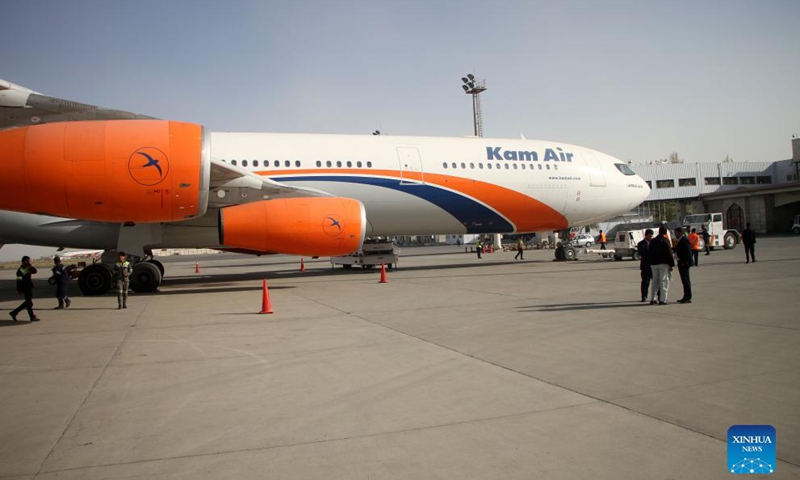China-Afghanistan cargo trains have never stopped, trade of agricultural products between the two countries is being restored, and China will carry on listening to the call of the Afghan people to offer support within its ability, Chinese Foreign Ministry spokesperson Wang Wenbin told a press conference on Tuesday.
Wang spoke after the first flight carrying 45 tons of Afghan pine nuts arrived at the Pudong International Airport in Shanghai from Kabul.
Afghan businessmen and foreign experts reached by the Global Times praised China for taking concrete measures to help the Afghan people by not only carrying on with bilateral trade but also offering humanitarian aid.
Analysts said that as stability in the war-torn country is gradually restored, more products from Afghanistan, including nuts, fruits and saffron, can help increase Afghan farmers’ incomes and encourage neighboring countries to help with the rebuilding of Afghanistan.
Tiny pine nuts could bring foreign currency to Afghanistan and ease local people’s difficulties. The “pine nut air corridor” is a reflection of the long-standing friendship and stable trade and economic cooperation between China and Afghanistan, the spokesman said.
On Monday, Wang Yu, Chinese Ambassador to Afghanistan, wrote on his Twitter account about the arrival of 45 tons of Afghan pine nuts at Shanghai, and said that in the coming months, tens of thousands of tons of pine nuts will be exported to China.
Pine nuts were the gift presented to Chinese State Councilor and Foreign Minister Wang Yi by Amir Khan Muttaqi, acting foreign minister of the Afghan interim government, during their meeting in the Qatari capital of Doha on October 26.
Afghan people view the trade in pine nuts to China with hope and gratitude, as it occurs when Afghanistan faces a special situation with its economy declining and many people suffering from poverty and unemployment, Salman Raha, an Afghan businessman who is in Yiwu, East China’s Zhejiang Province, told the Global Times on Tuesday.
“As an Afghan businessman, I want to thank the Chinese government for starting the direct flight to deliver the pine nuts, and I hope more Chinese can buy and taste the pine nuts,” said Raha, noting that he hoped more products, including grapes and pomegranates, could come to the Chinese market.
Analysts noted that China-Afghanistan cargo trains and flights en route to Northwest China’s Xinjiang Uygur Autonomous Region could also be used, as trade between China and Afghan increases. They noted that airports built in Xinjiang are good transit stations, for example, the Taxkorgan Airport, located in the Taxkorgan Tajik Autonomous County, which is expected to be finished next year. The county shares borders with Afghanistan and Pakistan.
The first China-Afghanistan cargo train ran in August 2016, linking Nantong in East China’s Jiangsu Province and Hairatan in northern Afghanistan, reducing the time to move products to one-fourth of the original. The train departed China with daily necessities, textiles and household appliances.

Afghanistan needs helping hand, not sanctions, for reconstruction. Illustration: Xia Qing/GT
Cargo trains can also play a role in transporting humanitarian aid to the war-torn country, experts said, because trains have incomparable advantages over air freight.
The trade in pine nuts showed that China is taking concrete measures in assisting the Afghan people. Given the COVID-19 epidemic situation globally, China has strict measures on imported goods. But it has now overcome difficulties to restore trade with Afghanistan to promote local residents’ incomes, which highlights China’s responsible attitude, Zhu Yongbiao, director of the Center for Afghanistan Studies in Lanzhou University, told the Global Times.
Analysts have expressed concern over the increasing humanitarian crisis in Afghanistan with the upcoming winter. However, aside from emergency assistance from China, Pakistan and a few countries, most of the Western countries and the US are giving lip-service promises.
China announced plans to offer food, materials for the winter, vaccines and medical products worth 200 million yuan ($31.4 million). The first batch of humanitarian assistance arrived at the Kabul international airport on September 29.
The Global Times learned from sources that the second batch will soon arrive in Afghanistan.
The Afghan people and the interim Afghan Taliban government are facing economic and political difficulties, and China’s moves would help encourage more neighboring countries to join in helping with Afghan people’s livelihoods, Zhu said.
Shakeel Ramay, director of the Pakistan Sustainable Development Policy Institute’s China Study Center, told the Global Times that as a landlocked country, Afghanistan relies on “air-bridges” in direct foreign trade. Exports of Afghan carpets and pine nuts are important to the livelihoods of many Afghan farmers and craftsmen.
As Afghan society gets more stable, Pakistan and other Afghan neighbors can help build more transport corridors to facilitate the nation’s trade. Pakistan hopes that the benefits of the China Pakistan Economic Corridor will expand to include Afghanistan and help the Afghan people rebuild their war-torn homeland, said Ramay.



